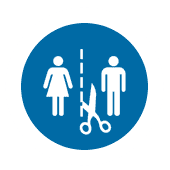Separation Agreement Lawyer in Edmonton, Alberta
A separation agreement allows two parting individuals to sort out their shared matters. This plan or agreement covers all issues that must be addressed when the relationship ends.
These issues can involve parenting arrangements, child custody, taking care of the children, how much time each party spends with them, and financial support.
The financial support also concerns how much money the spouse gets and how the property and debts will be divided. A separation agreement comes in handy in the long term when the couple officially wants an uncontested divorce.
At that point, the issues don’t need to be discussed in depth again since they’ve been covered by the agreement already. This makes it a swift and simple process with the help of respective family lawyers.
Contact Us For Private Consultation
What is a separation agreement?
A Separation agreement is a marital settlement agreement. It is a legal contract between spouses created once they decide to separate. It outlines the responsibilities and obligations of each party and is established before any court involvement. Here are the key elements of a separation agreement you need to know about:
- Legal Status: It’s a formal contract that is recognized by the court.
- Content: Specifies each spouse’s responsibilities and obligations.
- Timing: Created before any legal proceedings begin.
- Goal: Aims to prevent future complications and reduce stress.
It is important to note that although this process can mitigate future complications and stress, it requires both parties to seek independent legal advice from family law lawyers in Edmonton. According to Alberta’s family law, consulting with divorce lawyers in Edmonton is necessary for the agreement to be legally binding.
This ensures that the agreement is signed voluntarily, both parties receive appropriate legal counsel, and the agreement terms are clearly understood by all involved. It also helps legal advisors keep you informed on your rights and obligations under the agreement.
Essential Components of a Separation Agreement in Edmonton
When finalizing a separation agreement in Edmonton, it’s crucial to include specific elements that address the key aspects of your separation. A well-prepared agreement should clearly outline the following:
- Child Support: This section details the amount of money that will be provided to support the children’s needs.
- Spousal Support: It specifies the financial support, if any, one spouse will provide to the other post-separation.
- Division of Property: This part describes how all shared property, including assets and debts, will be divided between the spouses.
- Child Custody and Parenting Time: The agreement should state where the children will live and the schedule for when they will spend time with each parent.
- Dispute Resolution: It’s important to include how future disagreements will be resolved, whether through mediation, arbitration, or another method.
- Adjustments for Changes: The agreement should consider the potential adjustments or changes based on future circumstances.
Each matter needs to be clarified, and each party must be clearly aware of his/her rights and responsibilities. Since this list is not exhaustive, the court can consider other factors when determining whether the separation conditions are met.


What are the benefits of a separation agreement?
A divorce is never easy on the heart. Ending a relationship with so many “what ifs” can never be easy. However, the process can be made relatively amicable if a separation agreement exists. It can guide you to smoother future steps with minimal disagreements. Here’s why a separation agreement in Edmonton could work for you:
- Reduces Conflict: It helps make the separation process less argumentative.
- Keeps Promises: Both people are less likely to change their minds.
- Fairness for Both: There’s no winner or loser, making things fair.
- Flexibility: Allows couples to resolve some matters without going to court.
- Financial Clarity: Provides a clear view of each person’s finances after the divorce.
- Tax Benefits: Negotiating terms with tax benefits can save money.
- Prevents Future Problems: Helps avoid misunderstandings and disagreements later on.
A separation agreement can prevent many future legal complications for spouses. Separation agreement lawyers in Edmonton ensure that they cover all aspects such as property division, spousal support, and child custody. Courts generally uphold these agreements if they are deemed fair and are well-documented. Judges often use these agreements as reliable reference points during legal proceedings, underscoring the importance of having a thorough and equitable document.
Get All of Your Divorce Questions Answered by a Divorce Lawyer in Alberta
If you are considering divorce or have questions about the legal separation process, contact our office online or by phone at (780) 489-5003 to set up a consultation with one of our experienced family law attorneys today:
- Reshma Bhambhani, Partner
Who Can Get a Separation Agreement in Alberta and When
In Alberta, separation agreements are available to married couples and those in common-law relationships, often referred to as “adult interdependent relationships.” Eligibility for these agreements includes:
- Couples who have lived together for a continuous period of at least three years.
- Couples who, although not living together for three years, have entered into an Adult Interdependent Partnership Agreement.
- Couples who have lived together for less than three years but share parenting responsibilities for one or more children.
Couples can consult a lawyer to help draft the agreement anytime after they commence living separately. Even if it is not mandatory by law, having a separation agreement can significantly facilitate and speed up the divorce process.
Do We Need a Lawyer for Our Separation Agreement in Alberta?
A separation agreement is an agreement between two parties that mutually agree to separate but remain legally married. It encapsulates terms like parenting arrangements, child support, spousal support, property distribution, and child custody. Couples can come up with this agreement privately without the intervention of a court. Moreover, it can also serve as a medium for a relatively simpler divorce process in the future.
A divorce formally concludes a marriage through legal proceedings by a court or authorized government entity. Think of it as the official termination of the marriage rather than an annulment. A separation agreement can facilitate the divorce process but is not mandatory. Once the divorce is finalized, both individuals are legally free to remarry.
Contact Our Edmonton Separation Agreement Lawyers Today for Help
In legal matters, especially as important as a separation agreement, it’s crucial that you have a lawyer to assist you. Law practitioners usually better understand the intricacies that other individuals might overlook. Hence, before diving into any sort of legal agreement, consult the Edmonton divorce lawyers at KBL Law.

One party must be able to prove that the other party has committed Adultery using either evidence or an affidavit signed by the Adulterous spouse.

Under Alberta Law, any Act of Physical or Mental cruelty is grounds for Divorce. This includes Violence, Verbal Abuse, Drunkenness and Excessive drug use.

You and your spouse have lived apart (the “period of separation”) for at least one year prior to the Divorce Judgment made by the Court.
For experienced legal help with a divorce or separation in Alberta, contact KBL Law LLP. Our knowledgeable and compassionate divorce lawyers will work with you to finalize your divorce or separation and help provide you with a new path forward in your life.
FAQs
In Alberta, a separation agreement can cost between $2500 and $3000, while a contested divorce may cost over $20000.
No, you do not need a separation agreement if you are a common-law spouse in Alberta. However, it is advised to have a separation agreement that can protect both parties in the future.
The separation agreement is not necessary for a divorce. It is mainly a means to ensure no further problems arise in the eventual divorce process. You can legally divorce without separation in Canada.



